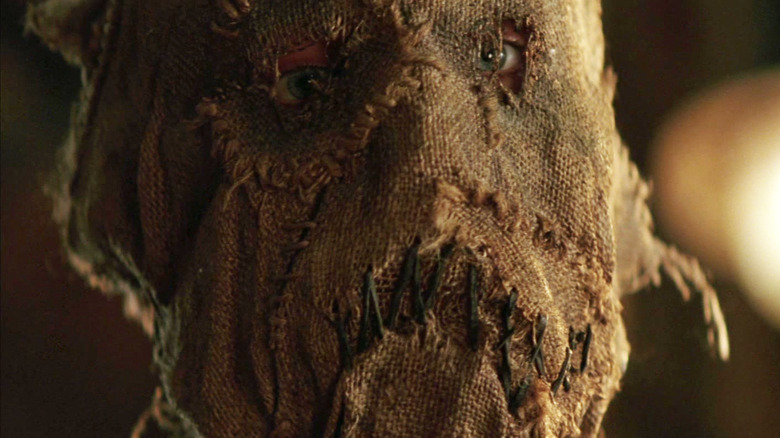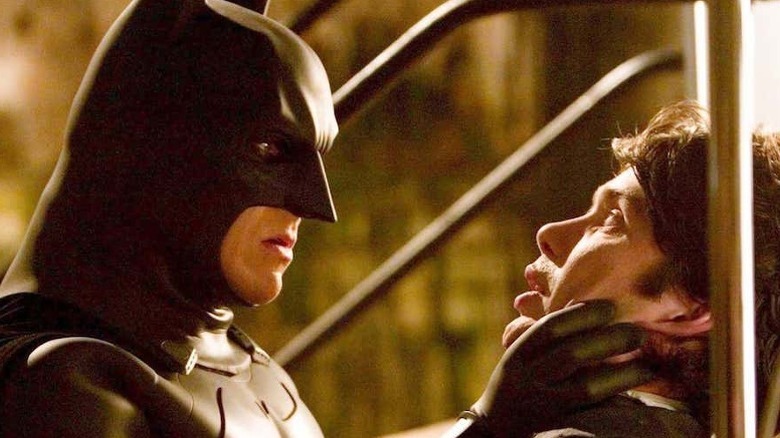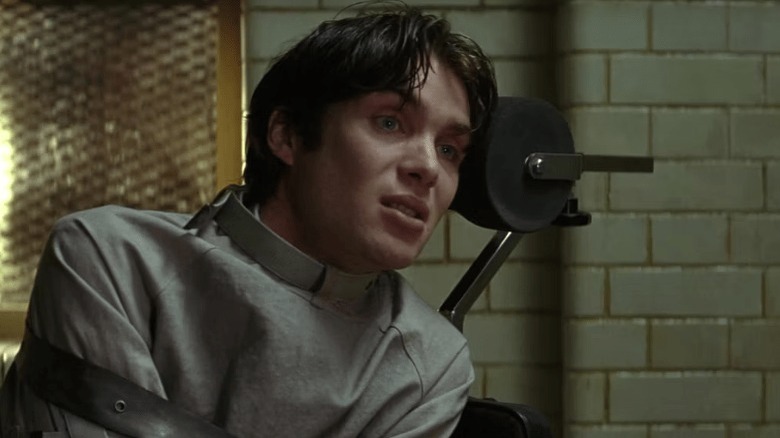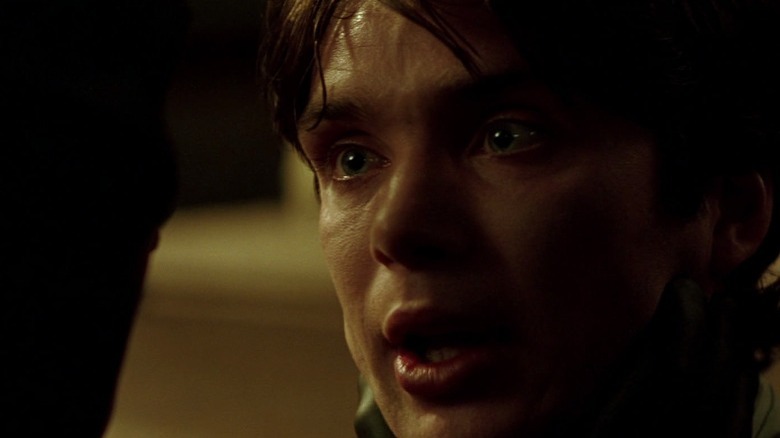Cillian Murphy's Batman Screen Test Immediately Landed Him The Part Of Scarecrow
Christopher Nolan is a director who seems to like bringing actors with him from one movie to the next. Tom Hardy, Joseph Gordon-Levitt, and Anne Hathaway got roles in multiple consecutive Nolan films, and legendary British thespian Michael Caine has gotten many brief appearances as well. Still, there are few actors who have worked with him as often as Cillian Murphy. It's a partnership that started with the 2005 film "Batman Begins," Nolan's notably serious and gritty reboot of the "Batman" film franchise.
Many decisions were made to distinguish that movie from what had come before with the series. Nolan and company dispensed with the over-the-top and stagebound Gotham of Tim Burton's 1989 film or the cartoony villains rendered in campy glory in Joel Schumacher's oft-criticized "Batman Forever" and "Batman and Robin" for this iteration of the character. This creative team needed a new kind of villain for a new and more grounded take on Batman, and the Scarecrow, who had yet to make an appearance on film (despite plans from both Burton and Schumacher to incorporate him in unmade sequels), fit in perfectly.
The Scarecrow (Murphy), the supervillain alias of psychopharmacologist Dr. Jonathan Crane, made for a great villain in Nolan's Batman origin story. Nolan must have liked the Scarecrow (and Murphy) a lot, because he shows up in both sequels. In a series with many of the most iconic blockbuster villains of the last 20 years, the Scarecrow still ranks highly, in no small part due to Murphy's interpretation of the character. But Murphy originally hadn't meant to play the Scarecrow — he had done a screen test to play Batman, and that was what got him the role of Batman's enemy.
The Batman casting
Playing Batman was a hot ticket, and many of the biggest up-and-coming male stars of the early '00s sought a chance to do it with Christopher Nolan's "Batman Begins." Whether it was the vengeful obsessions of the Caped Crusader or the playboy charisma of Bruce Wayne, Batman promised a memorable showing for anybody capable of taking up the mantle. The very premise of the movie being an origin story meant that it required a younger star, ideally one without too much baggage from the audience.
Plenty of names came up as the casting process commenced. While the name of Cillian Murphy, best known at the time for his role in Danny Boyle's "28 Days Later," arose in a Variety article on the casting, so did actors as varied as Jake Gyllenhaal, Joshua Jackson, and Christian Bale. These were young actors with something to prove, seeking out an opportunity to work with a director who was on a path to becoming a household name.
Of course, Bale ended up playing the character, balancing the Bruce Wayne side and superhero side perfectly, regardless of how you feel about his Bat-voice. The empty glamor of the character's rich heir side saw Bale tapping into his "American Psycho" persona, and he was able to bulk up enough to stave off comparisons to 2004's "The Machinist" (although that movie's emphasis on punishment and insomnia factored into "Batman Begins").
Still, Murphy had gotten far along in the casting, and Nolan found something very appealing about the actor that would lead to his getting cast in the movie in another role.
Crazy eyes
While Christopher Nolan's 2023 film "Oppenheimer" promises to give Cillian Murphy his first complex and nuanced leading man role for the director, they have had a strong partnership beginning with the early stages of those "Batman Begins" casting sessions. As the two said in a conversation for Entertainment Weekly, Murphy had been a fan of Nolan's since seeing his breakthrough 2000 psychological thriller "Memento." And Nolan, having seen an article about "28 Days Later," found himself struck by Murphy's look, in particular his "crazy eyes." Seeing that photo gave Nolan an impression of a man who could be his Batman.
It's possible that Murphy's appearance, with his sharp cheekbones and unmistakable intensity, made it easier to perceive him first as a screen villain. After all, Murphy's first big role after "Batman Begins" was as a creepy domestic terrorist in Wes Craven's 2005 film "Red Eye," and his most significant role over the last decade was probably that of crime boss Tommy Shelby in the television show "Peaky Blinders." Still, with Nolan planning for a more psychologically rich portrait of Batman than had yet been seen in movies, Murphy could have been appropriate casting. As well, Nolan's first meeting with Murphy assured him this was somebody he would like to work with again, somebody with whom he "felt an immediate connection" (via EW).
Playing the villain
As Cillian Murphy recalled to Christopher Nolan (per EW), "It was clear to me from the beginning that I wasn't Batman material." But the experience of working with Nolan on those screen tests gave Murphy a "buzz," both from playing Batman and forging the beginning stages of a creative partnership with the director. As Nolan said, they knew from their first conversation that Murphy likely wouldn't be Batman, but that was irrelevant — they still found common creative cause with each other. And Nolan knew Murphy could be a unique and memorable villain for his unique take on Batman.
With a relative unknown playing the superhero, it made sense to give him a marquee name antagonist. From Jack Nicholson (as the Joker in 1989's "Batman") onward, the "Batman" film series had cast massive movie stars as its villains, often significantly bigger than the actors playing the hero. Murphy, while clearly a talent, wasn't that, so Nolan shrewdly used the big screen test with Murphy as a means of convincing Warner Bros. executives that the actor had the chops to play the movie's villain.
"There was no dissent," Nolan remembered after asking executives about casting Murphy. With a brilliant showing at the screen test, Murphy's lack of fame at the time proved irrelevant. He and Nolan immediately got to work on the character, with Murphy telling Empire at the time that he and Nolan collaborated on a realistic and creepy design for the Scarecrow, one where he would be draped in a burlap sack.
And while the director never meant for "Batman Begins" to kick off a trilogy, Murphy's returning presence as the Scarecrow in both sequels gives the series a strong sense of continuity (one reflective of the fondness between the director and the actor).



